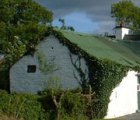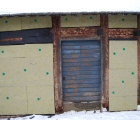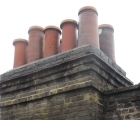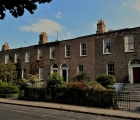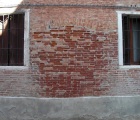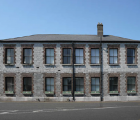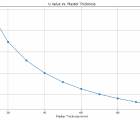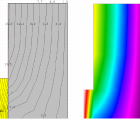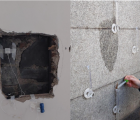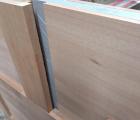National Scientific Committee Energy & Sustainability
Introduction
The National Scientific Committee on Energy and Sustainability was established in 2013 as a mirror committee to the ICOMOS International Scientific Committee on Energy and Sustainability.
The aim of the Committee is to further the conservation and protection of heritage places through the soundly-based application of energy conservation and sustainable development principles to heritage places.
- In particular, the Committee’s objectives are to:
- promote awareness of the conservation of heritage places as part of the conservation of the world’s scarce resources, and of the energy conservation and sustainability inherent in heritage places;
- serve as a body of national experts in the application of energy conservation and sustainability principles in the conservation of heritage places;
- participate in, collate, disseminate and promote research in the area of energy conservation and sustainable development affecting heritage places;
- provide a forum for discussion and for the exchange of information, regionally and nationally, on matters of principle and of technical, legal and administrative practice affecting the application of energy conservation and sustainability principles to the conservation of heritage places;
- provide information for government departments, the educational sector, the general public, political organizations, professional bodies and other relevant bodies about the application of energy conservation and sustainability principles in the conservation of heritage places;
- encourage and facilitate communication and exchange of information on energy and sustainability matters with other ICOMOS Ireland National Scientific Committees and working groups;
- undertake other activities related to issues of energy and sustainability in the context of cultural heritage;
Committee Members
The NSCES is:
President: David Hughes
Secretary: Leila Budd
Members: John Beattie, Laura Bowen, Peter Cox, Rosaleen Crushell, Damien Curry, Naomi Deegan, Fintan Duffy, Caroline Engel, Audrey Farrell, Aoife Hurley, Joseph Little, Deirdre McDermott, Catherine McLoughlin, Colm Murray, Toal O’Muire, Carl Raftery
Activities & Programme of Works
This NSC is developing a Programme of Work which will be posted on this website once approved.
Rules of Governance
These Rules may be referred to as the Rules of the National Scientific Committee for Energy and Sustainability of ICOMOS Ireland.
Summary:
Click on the name of the items you are interested in:
- Establishment
- Definitions
- Aims and activities
- Membership
- Financing
- Administration
- Amendments
- Dissolution
- rte
Establishment
The National Scientific Committee for Energy and Sustainability was established in 2013 as a mirror committee to the ISCES and is to be known as NSCES but for the purpose of clarity within these Rules is hereinafter called “the Committee”. This Committee is established in accordance with the Statutes of ICOMOS, the Eger Xian Principles and the Memorandum and Articles of Association of ICOMOS Ireland. These Rules of Governance which were approved by the Executive Committee of ICOMOS Ireland on the 11th day of June 2013 determine the Committee’s aims and objectives and the scope of its activities.
Definitions
In these Rules:
“Sustainable development” means development that meets the needs of the present without compromising the ability of future generations to meet their own needs, in accordance with the definition given in the Report of the World Commission on Environment and Development: Our Common Future (1987)
Membership
(a) Members may be admitted to the Committee as expert members, associate members, non-ICOMOS members and institutional members.
(b) Members of the Committee will adhere to the Eger Xian principles .
(c) Expert members must demonstrate competency in the area of the Committee’s work through a minimum of ten years of relevant professional experience, education and training, and must commit to active participation in the work of the Committee.
(d) Individuals who do not meet the criteria for expert membership may be admitted as associate members. Associate members may be considered for expert membership after three years.
(e) Non-ICOMOS members may be invited to participate in meetings and activities of the Committee, and may be admitted to membership of the Committee if so resolved by a majority of votes of the expert members at a meeting of the Committee. Non-ICOMOS members will have no voting rights and will be ineligible to hold office.
Financing
(a) The activities of the Committee shall be financed by funds allocated by ICOMOS Ireland, by funds obtained by the Committee on its own initiative from international and national organisations including other ICOMOS International Scientific Committees, and by funds from any other source which may include gifts, bequests or sponsorship, always provided that the source of funding does not conflict with the aims and objectives of the Committee.
(b) The members of the Committee, shall themselves obtain the funds necessary to allow their own participation in the activities of the Committee and their presence at meetings. Work for the Committee will be entirely voluntary unless otherwise decided by the Committee.
(c) Any funds raised by the Committee shall be held and managed by the Treasurer of the Executive of ICOMOS Ireland.
Administration
Committee meetings
(1) The Committee may meet as often as is necessary to conduct its business, and must meet at least three times per year.
(2) At its first meeting, the Committee must hold elections for officers of the NSC, this must include a President, Vice President, Secretary and at minimum of two ordinary members of the committee.
(3) At subsequent meetings the Committee may do such things as are necessary and convenient to further its aims and pursue its activities, and must:
(4) The quorum for a committee meeting will be a minimum of 3 committee members:
(5) The quorum for a general committee meeting is 25% of the expert members of the Committee.
(6) In the absence of the President, the Vice-President should preside, or if the vice president is not present the secretary shall preside over the committee meeting.
Annual report
The Committee must draw up and submit to the National Committee of ICOMOS Ireland an annual report.
Triennial Plan
(1) In the year of establishment, the Committee must draw up a triennial program or plan of activities which must be in accordance with the Rules of procedure,the Memorandum and Articles of Association of ICOMOS Ireland which includes clear and precise objectives for the forthcoming triennium, a work program and, if applicable, a budget with a financial plan.
(2) The triennial program must be forwarded to the Executive Committee of ICOMOS Ireland not less than three months from the date of establishment.
Voting at Committee meetings
(1) Questions arising at any meeting of the Committee (other than elections or amendments to the Statutes) shall be decided by a majority of votes of the members present or represented by proxy. A voting member may not hold or exercise the proxy of more than two absent expert members.
Officers of the Committee
The members of the National Scientific Committee must choose from amongst its voting members the following officers who form the executive of the NSC:
(a) a President.
(b) a Vice-President.
(c) a Secretary.
(d) a minimum of 3 ordinary members.
Publications and Links
The Heritage Council, ICOMOS Ireland and partners have produced a report on Deep Energy Renovation of Traditional Buildings with support from the Sustainable Energy Authority of Ireland (SEAI). The report deals with how to reduce energy use in older buildings that are constructed differently to modern buildings and so need a different approach.
This much-needed body of research includes and highlights potential renovation risks such as damp. It is designed to inform building professionals and specifiers but would be of interest to anyone looking to make an older building warmer and more comfortable. The report is available to download for free from the Heritage Council and ICOMOS Ireland websites and includes hundreds of links to further sources of information.
The report is the result of a research project commissioned by the Heritage Council and funded by a grant from the SEAI Research, Development and Dissemination Programme. The research was carried out by Dr Caroline Engel Purcell, with the support of Carrig Conservation International Ltd, and the ICOMOS Ireland National Scientific Committee on Energy, Sustainability and Climate Change (NSCES+CC) acted as the expert Steering Committee.
A link to the final report is available here.
- ICOMOS International Scientific Committee for Energy and Sustainability (ISCES) http://isces.icomos.org/
- Sustainable Traditional Buildings Alliance (STBA) The Sustainable Traditional Buildings Alliance (STBA) is a collaboration of not for profit organisations, promoting Responsible Retrofit (Energy, Health & Heritage) for a sustainable traditional built environment. http://stbauk.org/
- Historic Environment Scotland https://www.historicenvironment.scot/advice-and-support/your-property/saving-energy-in-traditional-buildings/
- The Society for the Protection of Ancient Buildings (SPAB) http://www.spab.org.uk/advice/energy-efficiency/
- Energy Efficiency for EU Historic Districts’ Sustainability (EFFESUS) EFFESUS is a research project investigating the energy efficiency of European historic urban districts and developing technologies and systems for its improvement. http://www.effesus.eu/
- Energy Efficiency in European Historic Urban Districts; A Practical Guidance (EFFESUS 2016) http://www.effesus.eu/wp-content/uploads/2016/06/EFFESUS_Booklet_Final-Version.pdf
- Sustainable Building Conservation; Theory and Practice of Responsive Design in the Heritage Environment (RIBA 2015) http://www.ribabookshops.com/item/sustainable-building-conservation-theory-and-practice-of-responsive-design-in-the-heritage-environment/82398/


